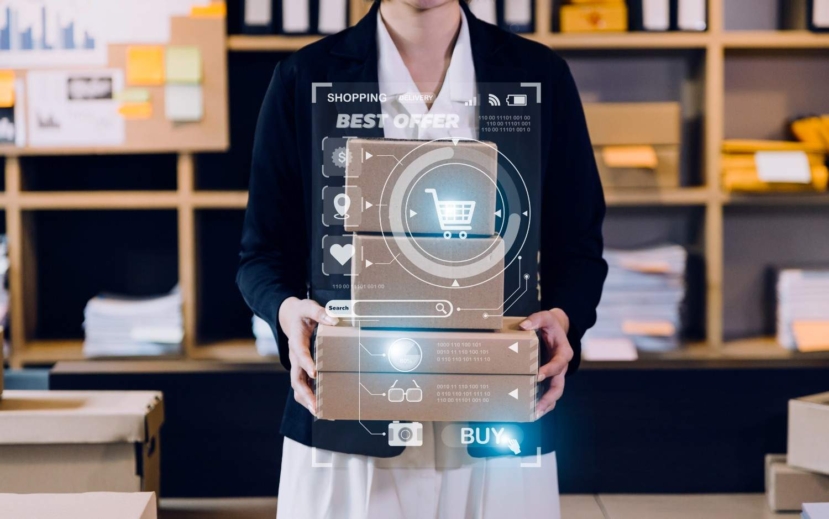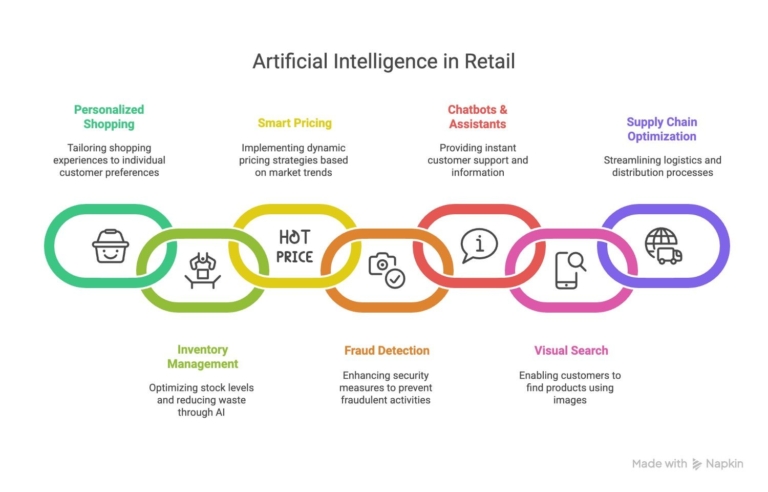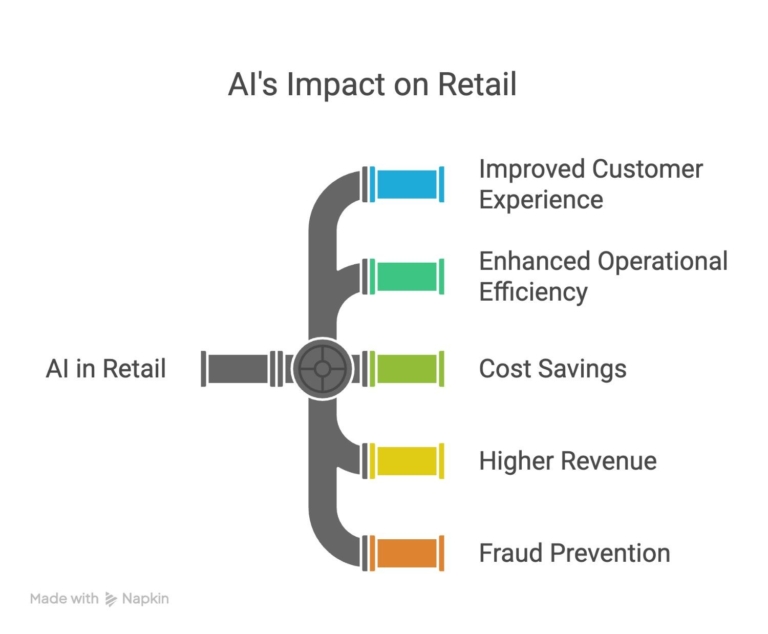Greetings! I'm Aneesh Sreedharan, CEO of 2Hats Logic Solutions. At 2Hats Logic Solutions, we are dedicated to providing technical expertise and resolving your concerns in the world of technology. Our blog page serves as a resource where we share insights and experiences, offering valuable perspectives on your queries.

The retail industry is changing faster than ever. Customers are looking for personalized shopping experiences. Artificial intelligence in retail is transforming the way businesses operate. Retailers who once relied solely on traditional strategies are now embracing AI. AI is paving way to stay competitive, reduce costs, and deliver exceptional customer experiences.
In this blog, we’ll explore the best AI retail solutions, practical use cases, benefits, and how to successfully implement AI in your business with the help of experts.
Want AI tailored to your retail business?
Top Use Cases of Artificial Intelligence in Retail

1. Personalized Shopping Experiences
Nobody likes scrolling endlessly to find “the one” product. That’s where AI steps in. By analyzing past purchases, browsing habits, and even real-time interactions, AI creates a shopping journey that feels tailor-made. Customers see product recommendations that actually make sense, saving time and making shopping more enjoyable. Recommendation engines powered by machine learning filter through thousands of SKUs, segment customers by behavior, and predict what each shopper is most likely to purchase. This transforms “window shoppers” into paying customers while maximizing basket value.
Why it’s beneficial for customers: They discover products they truly need (and sometimes didn’t even know existed) without the hassle.
Why it’s valuable for businesses: Personalized experiences drive higher engagement and conversion rates. When shoppers feel understood, they’re more likely to buy, return for repeat purchases, and remain loyal to the brand.
2. AI-Powered Inventory Management
AI in retail stores changes that by forecasting demand with high accuracy. Instead of guessing, retailers can stock the right products at the right time. That means no more empty shelves for in-demand items and no wasted money on overstock that just sits in the warehouse.
Why it’s beneficial for customers: Shoppers find what they want when they want it. This leads to a smoother, more reliable shopping experience.
Why it’s valuable for businesses: Accurate inventory management reduces carrying costs, prevents lost sales from stockouts, and improves cash flow by ensuring money isn’t tied up in unsold goods. It also boosts customer trust, since consistent product availability makes a brand more dependable.
3. Smart Pricing Strategies
We’ve all wondered if we’re really getting the best deal. With AI-driven dynamic pricing, retailers can offer fair prices that balance demand, seasonality, and competition. That means discounts when products are slow-moving and competitive pricing during peak seasons.
Why it’s beneficial for customers: They get access to timely offers and better deals without feeling overcharged.
4. Fraud Detection and Security
Online shoppers worry about payment safety. AI tools spot unusual patterns in transactions, like sudden bulk purchases or multiple failed payment attempts. This helps retailers to block fraud before it affects genuine customers. In physical stores, AI-powered surveillance adds another layer of safety.
5. Chatbots and Virtual Assistants
Waiting on hold for customer support is so last decade. AI-powered chatbots answer questions instantly whether it’s about order tracking, returns, or product details.
Why it’s beneficial for customers: They get quick, accurate help 24/7, without needing to wait for business hours or human agents.
6. Visual Search and Computer Vision
Computer vision is more than about search. Using OCR (Optical Character Recognition), retailers can scan and digitize product labels, receipts, and shelf tags in seconds. This speeds up catalog management, reduces errors, and ensures product data stays accurate across platforms. Computer vision models identify objects in images, match them with catalog data, and recognize printed or handwritten text with OCR. This helps retailers bridge the gap between online and offline shopping experiences.
Why it’s beneficial for customers: Shoppers get a frictionless way to discover products, while enjoying accurate product details, smoother checkout, and fewer errors in pricing or labeling.
Why it’s valuable for businesses: Visual search drives engagement and conversions, while OCR saves hours of manual work, keeps product data clean, and supports automation in inventory and pricing management.
7. Supply Chain Optimization
Late deliveries can ruin the excitement of shopping online. AI predicts delays, finds better shipping routes, and ensures products reach customers on time.
Why it’s beneficial for customers: Faster, more reliable deliveries that make shopping feel effortless.
Tired of slow processes and rising costs? Automate retail with AI.
Benefits of Artificial Intelligence in Retail
Take a look at how beneficial would be to use artificial intelligence for retail purposes.

- Improved Customer Experience – Hyper-personalized recommendations and seamless shopping journeys.
- Operational Efficiency – Automation of repetitive tasks and accurate demand forecasting.
- Cost Savings – Reduced wastage in inventory and logistics.
- Higher Revenue – Smarter pricing and targeted promotions lead to more conversions.
- Fraud Prevention – Early detection of fraudulent activities saves losses.
Tired of slow processes and rising costs? Automate retail with AI.
How to Implement AI in Retail
Implementing AI doesn’t mean replacing human expertise. Instead, it complements existing processes with automation and intelligence. Here’s how retailers can get started:
- Identify Key Business Needs – Decide whether your focus is on customer experience, inventory, or supply chain.
- Choose the Right AI Retail Solutions – From chatbots to predictive analytics, select tools aligned with your goals.
- Integrate with Existing Systems – Ensure AI solutions work smoothly with your POS, CRM, or ERP systems.
- Train Teams – Educate employees on how to use AI effectively.
- Measure and Scale – Start small, track performance, and scale successful use cases.
Why Work with AI Experts?
While ready-made tools exist, successful AI adoption requires strategy, customization, and proper integration. Working with AI experts ensures:
- Tailored solutions specific to your retail business.
- Smooth integration with existing systems.
- Continuous improvement and updates as your business grows.
At 2Hats Logic, we build custom AI retail solutions that solve real business challenges
Conclusion
Artificial intelligence in retail is no longer a future trend. It’s a necessity for businesses that want to thrive in today’s competitive market. From personalized shopping experiences to smarter supply chains, AI brings countless opportunities to boost efficiency, revenue, and customer satisfaction.
Whether you’re running a retail store, e-commerce business, or an omni-channel brand, now is the time to explore AI retail solutions and unlock new growth opportunities.
FAQ
How is artificial intelligence used in the retail industry?
Artificial intelligence in the retail industry is used for personalized recommendations, smart inventory management, fraud detection, and process automation. Retailers also use AI retail solutions like chatbots and visual search to enhance customer experiences and streamline operations.
What are the benefits of AI in retail stores?
AI in retail stores improves customer experience by ensuring product availability, accurate pricing, and faster checkouts. It also helps retailers reduce costs, optimize supply chains, and increase sales through predictive analytics and automation.
What are the best AI retail solutions for businesses?
The best AI retail solutions include personalized product recommendations, dynamic pricing systems, AI-powered chatbots, computer vision with OCR, and predictive analytics for demand forecasting.

Related Articles







